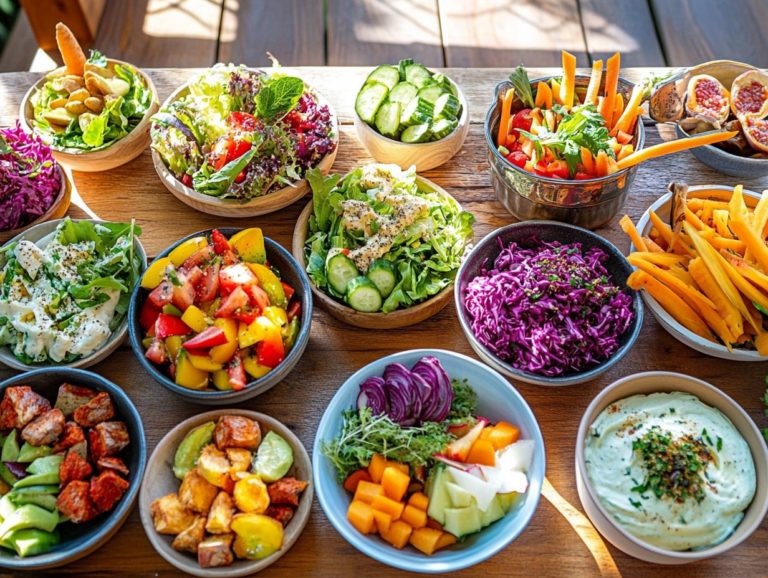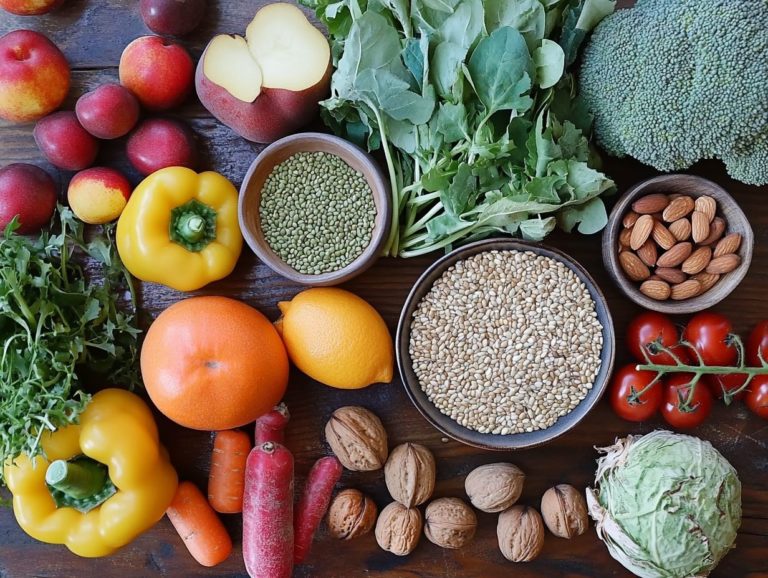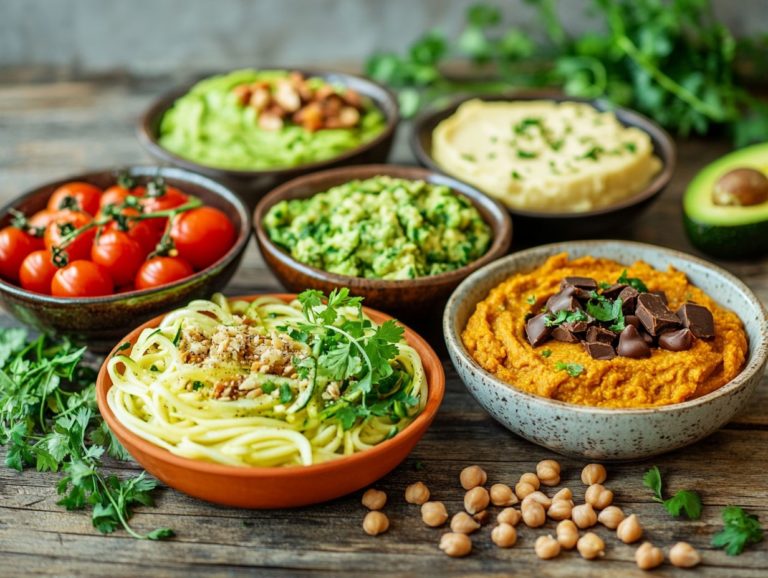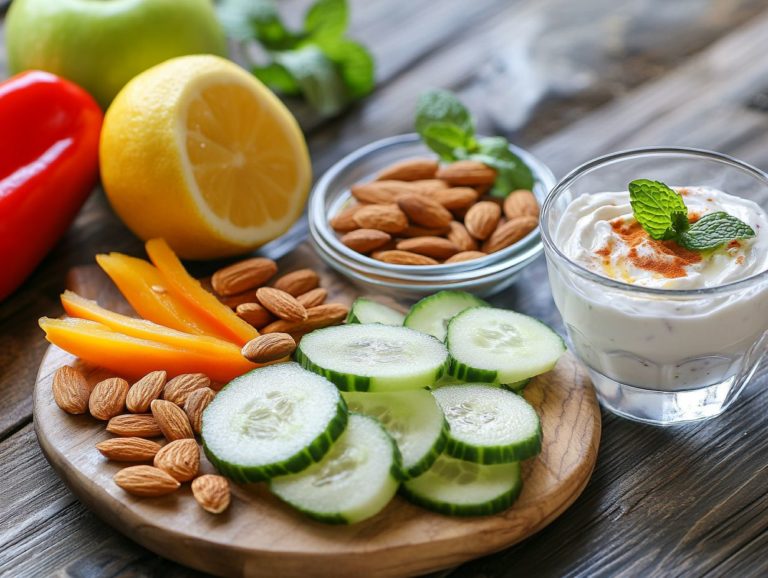Top 5 Whole Foods to Incorporate Daily
In today s fast-paced world, maintaining a healthy diet can be challenging. But don t worry incorporating whole foods into your meals is a simple and effective way to nourish your body.
This article spotlights five whole foods: leafy greens, berries, nuts and seeds, whole grains, and avocado. Each ingredient is packed with essential nutrients your body craves.
We ll explore their nutritional benefits, clarify common misconceptions, and offer practical tips to seamlessly include them in your routine. Plus, we ll share delicious recipes to spark your culinary creativity.
Dive in and discover how these wholesome ingredients can elevate your health!
Contents
Key Takeaways:
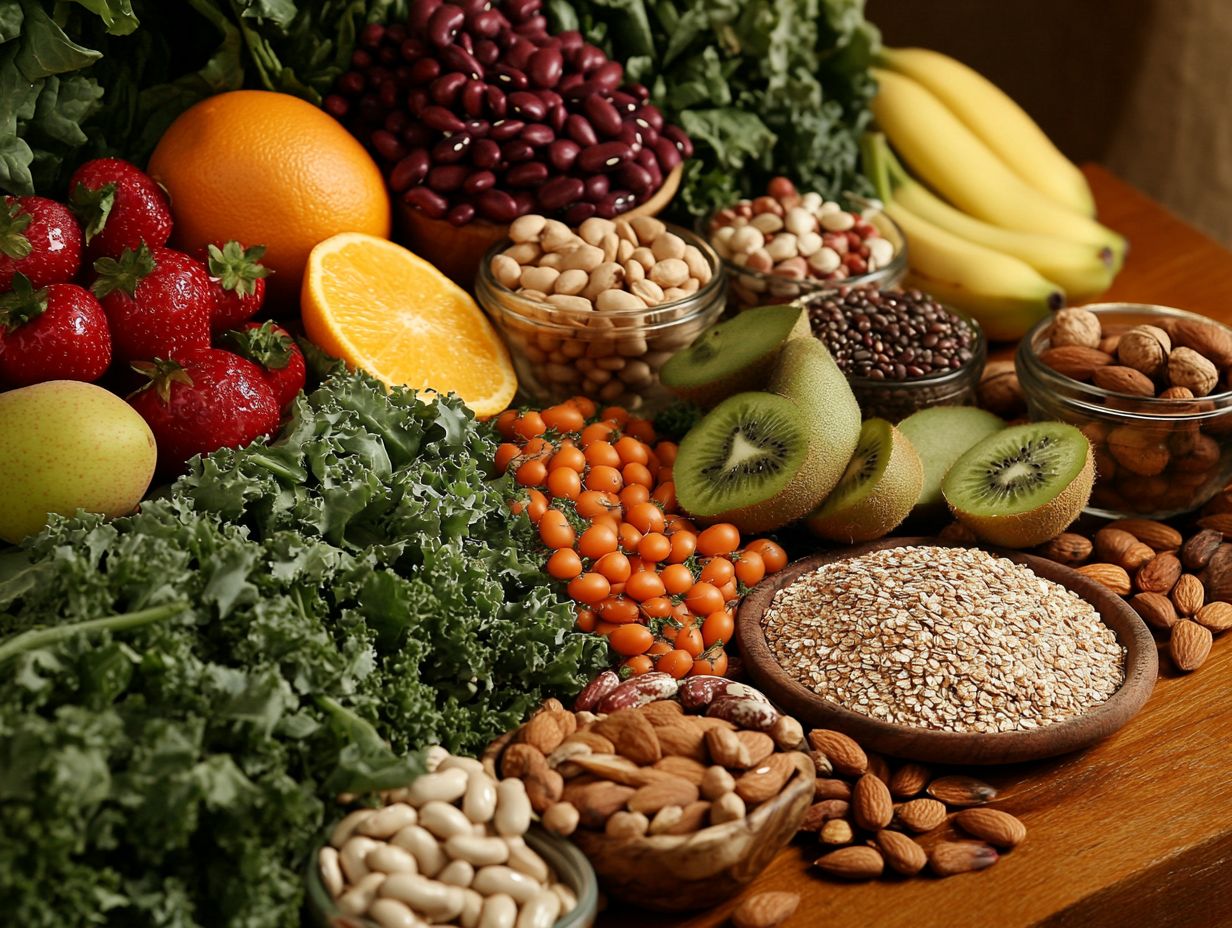
Leafy greens, berries, nuts and seeds, whole grains, and avocado provide a variety of nutritional benefits for a healthy diet. Incorporating these foods into your daily meals is essential for maintaining a balanced diet that is both safe and delicious.
1. Leafy Greens
Leafy greens, like spinach and kale, are nutritional powerhouses. They bring an abundance of health benefits to your table.
These vibrant greens help prevent long-term health issues, particularly lowering the risk of type 2 diabetes and heart disease. Their rich mix of vitamins, minerals, and plant-based nutrients supports healthy blood sugar levels and enhances heart function.
Try these tasty ideas to add more leafy greens to your meals:
- Saut spinach with garlic for a flavorful side dish.
- Toss arugula and kale into a hearty salad, topped with nuts and a zesty citrus vinaigrette.
Blending kale or Swiss chard into your smoothies transforms your breakfast into a nutrient-dense powerhouse. It boosts your energy levels and adds a refreshing twist to your morning routine.
2. Berries
Berries, such as blueberries and strawberries, are packed with antioxidants. They offer numerous health benefits, making them a great choice for a whole-foods diet.
These vibrant fruits not only delight your palate but also help reduce inflammation and enhance heart health, lowering the risk of chronic diseases like diabetes and certain cancers.
Incorporating them into your meals is easy and enjoyable. For example, a berry smoothie blended with spinach and yogurt makes a nutritious breakfast that you ll love.
Tossing a handful of berries into your salads boosts flavor and nutrients, contributing to a well-rounded diet that supports overall well-being.
3. Nuts and Seeds
Nuts and seeds are essential to a whole-foods diet. They deliver healthy fats and vital nutrients that promote heart health and overall wellness.
Including a variety of nuts and seeds in your meals can significantly impact chronic kidney disease and autoimmune conditions. For instance, walnuts and flaxseeds are rich in omega-3 fatty acids, which may help reduce inflammation. Almonds provide vitamin E for antioxidant support, while pumpkin seeds are loaded with magnesium, essential for balanced kidney function.
Consider tossing a handful of nuts into your oatmeal or blending seeds into your smoothies for a nutritious boost. Roasting nuts with herbs or using them in homemade granola elevates flavor and creates delightful snacks tailored to your dietary needs.
Incorporating these whole foods into your diet is a delicious step toward better health. Start today and feel the difference!
4. Whole Grains
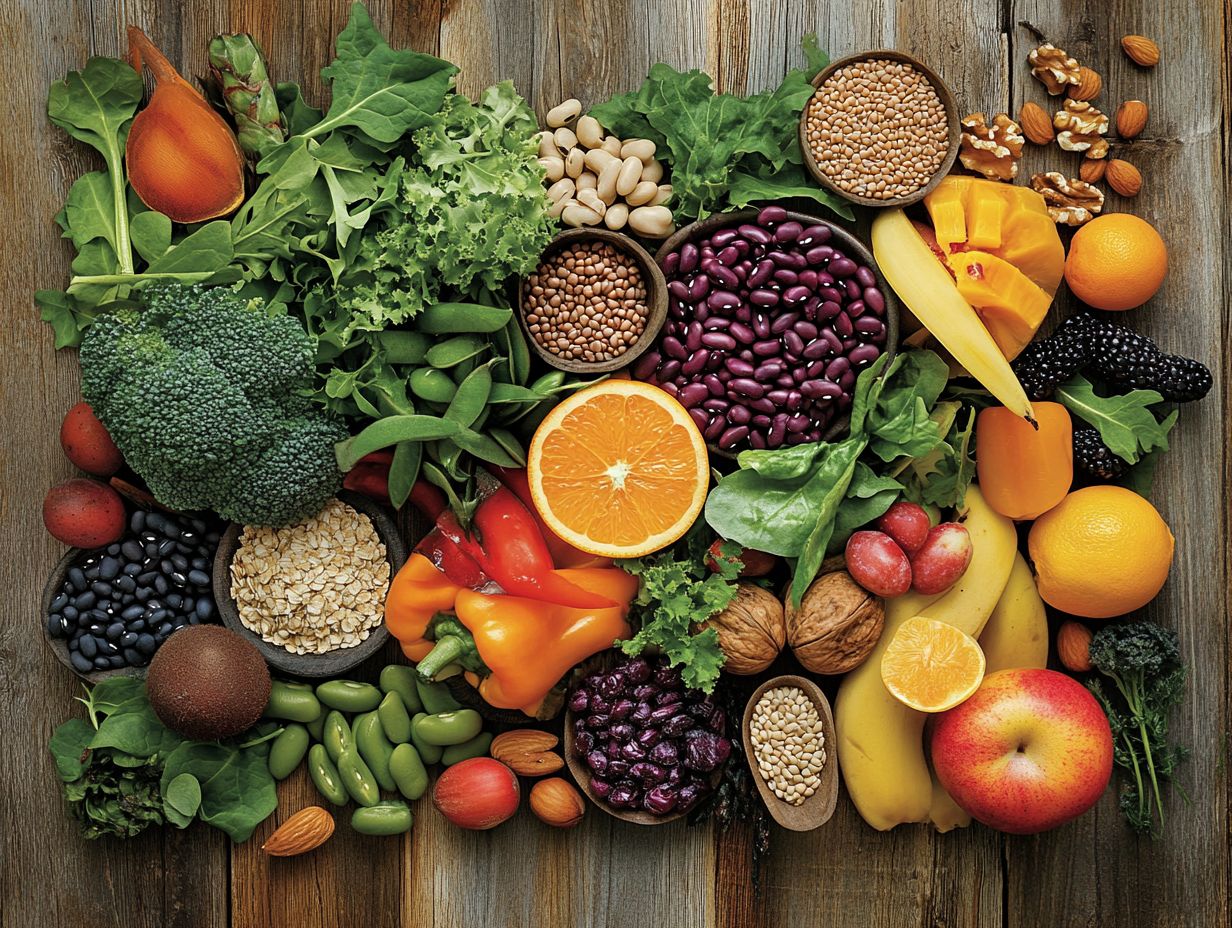
Whole grains, such as quinoa and brown rice, are essential to a whole-foods diet. They are high in fiber and offer numerous health benefits, including weight loss support and reduced risks associated with processed foods.
These healthy options, along with barley, farro, and bulgur, provide a rich source of vitamins and minerals crucial for maintaining optimal health.
Incorporating whole grains into your meal prep is a breeze; they serve as fantastic bases for salads, bowls, or side dishes. When you pair them with vibrant vegetables and lean proteins, you can whip up satisfying meals that delight your taste buds while promoting long-term wellness.
Regularly eating these grains has been linked to a reduced risk of chronic diseases, such as heart disease and diabetes, making them a foundational element of healthy eating.
5. Avocado
Avocado is a versatile fruit that s brimming with healthy fats and nutrients, making it an ideal companion for your whole-foods diet and a delightful addition to countless meal ideas.
Rich in monounsaturated fats, avocados are your heart s best friend; they help lower bad cholesterol levels and reduce the risk of heart disease. Their impressive fiber content also plays a key role in weight management, promoting a satisfying feeling of fullness while aiding digestion.
Want to add this powerhouse fruit to your meals? Here are some delicious ideas! Consider adding slices to a crisp salad for an elevation in both flavor and texture. Or blend it into a smoothie, where it creates a creamy base that boosts nutrition without overpowering other ingredients.
From guacamole to avocado toast, the delicious possibilities for enjoying this nutritious gem are truly endless.
Why Are Whole Foods Important for a Healthy Diet?
Whole foods are essential for your healthy diet, delivering vital nutrients without the additives and health risks tied to processed options. They play a crucial role in preventing chronic diseases and managing your overall health.
These foods are packed with vitamins, minerals, fiber, and antioxidants, which are important for strengthening your immune system and helping your body fend off illnesses effectively. Nutritional experts and registered dietitians consistently recommend a diet abundant in fruits, vegetables, whole grains, and lean proteins as the best choices for enhancing your well-being.
For example, incorporating:
- Dark leafy greens like spinach and kale
- Antioxidant-rich berries
- Legumes that are rich in protein and fiber
can significantly boost your nutritional intake. By embracing whole foods, you’re not only supporting your immune health but also cultivating sustainable eating habits that contribute to your long-term vitality.
What Are the Nutritional Benefits of Each Whole Food?
The nutritional benefits of whole foods think leafy greens, berries, and whole grains are truly impressive. They provide essential vitamins, dietary fiber, and antioxidants that are crucial for maintaining your health and preventing chronic diseases.
These foods work together beautifully to enhance your overall well-being. For example, leafy greens like spinach and kale are brimming with vitamin K, which is vital for bone health. Meanwhile, berries are rich in anthocyanins, known to boost heart health and reduce inflammation.
Whole grains, on the other hand, deliver a significant punch of soluble fiber, which helps control blood sugar levels especially beneficial if you re managing type 2 diabetes.
By weaving these nutrient-dense foods into your daily meals, you can strengthen your body s defenses against conditions like heart disease, embracing a holistic approach to health management.
Start experimenting with these delicious ideas today!
How Can Whole Foods Be Incorporated into Daily Meals?
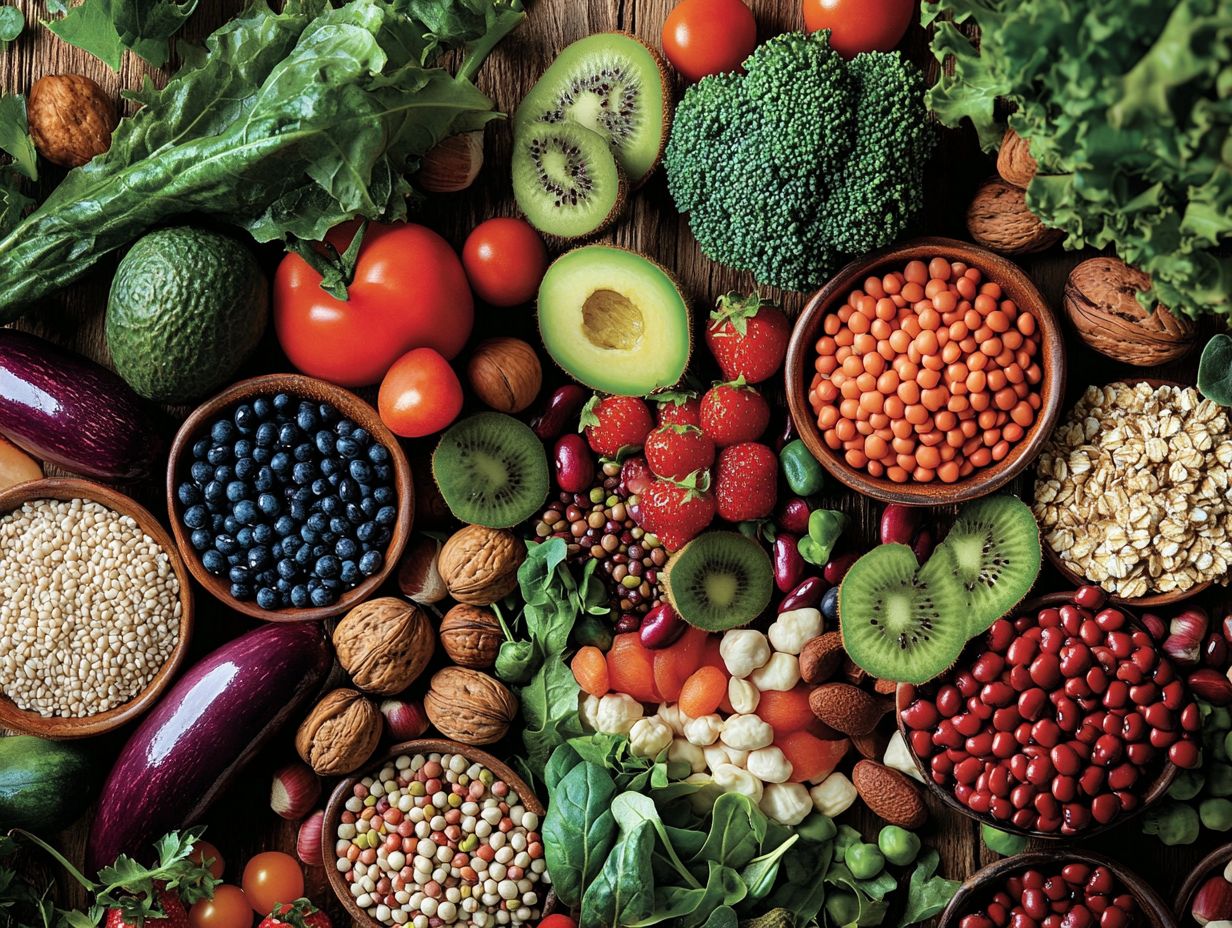
Incorporar alimentos integrales en tus comidas diarias es una forma de arte que se puede dominar f cilmente a trav s de una planificaci n y preparaci n de comidas reflexiva.
Al utilizar una variedad de t cnicas de cocina, puedes crear platos que no solo son deliciosos, sino tambi n nutritivos, apoyando una dieta bien equilibrada.
Tomar el tiempo para planificar tus comidas con anticipaci n te permite resaltar diferentes ingredientes integrales cada semana.
Por ejemplo, cuando preparas una generosa cantidad de verduras asadas piensa en batatas, pimientos y calabacines preparas el escenario para una base sabrosa para innumerables comidas.
Imagina comenzar tu d a con una simple pero satisfactoria tortilla de verduras.
Luego, pasa a una vibrante ensalada adornada con camarones a la parrilla para el almuerzo.
La belleza de los alimentos integrales radica en su versatilidad, invitando a que tu creatividad culinaria florezca.
Al experimentar con m todos de cocci n como asar, cocinar al vapor o saltear, puedes elevar los sabores y nutrientes naturales de estos ingredientes.
Esto resulta en opciones de comida que deleitan tu paladar y promueven el bienestar general.
What Are Some Common Misconceptions About Whole Foods?
Common misconceptions about whole foods can lead to confusion about their role in healthy eating.
Many underestimate their health benefits or mistakenly think they are difficult to incorporate into a balanced diet.
Knowing what whole foods really are shows how beneficial they can be.
Whole foods think fruits, vegetables, whole grains, and lean proteins are packed with essential vitamins, minerals, and fiber that processed options often lack.
With the right food education, you can discover how these natural choices fit effortlessly into your meal planning, enabling you to make informed dietary decisions!
This knowledge not only helps you avoid the numerous health risks associated with highly processed foods but also cultivates a deeper appreciation for the rich flavors and textures that whole foods bring to your everyday meals.
Are There Any Risks Associated with Consuming Whole Foods?
Whole foods are known for their many health benefits, but it’s important to recognize that some risks may accompany them, particularly for those with specific dietary sensitivities.
Take nut allergies, for example; even the tiniest trace can provoke a severe reaction, prompting a cautious approach to snack choices.
If gluten sensitivity is your concern, vigilance is key, as many whole grains contain this protein.
Food specialists stress the importance of knowing your health needs.
They advocate for thoughtful planning and informed substitutions to effectively manage these risks.
By adhering to established dietary guidelines and maintaining regular consultations with healthcare providers, you can relish the vibrant array of whole foods while minimizing any potential adverse effects!
This paves the way for a balanced and healthful approach to nutrition.
What Are Some Easy and Delicious Recipes Using These Whole Foods?
Creating easy and delicious recipes with whole foods can elevate your meals to a whole new level!
By focusing on cooking techniques that enhance both flavor and nutrition, you can effortlessly transform your everyday meals.
Take, for instance, a vibrant quinoa salad brimming with seasonal vegetables; it not only delights your palate but also delivers a wholesome punch.
Or consider a refreshing smoothie made with a medley of berries and creamy yogurt it s the perfect breakfast option, packed with fiber and antioxidants.
These dishes exemplify how incorporating whole foods into your daily cooking can lead to a more nutritious lifestyle without sacrificing taste.
Exploring these combinations will undoubtedly spark your creativity in the kitchen!
So why not dive in and explore the endless possibilities of whole foods today?
Frequently Asked Questions
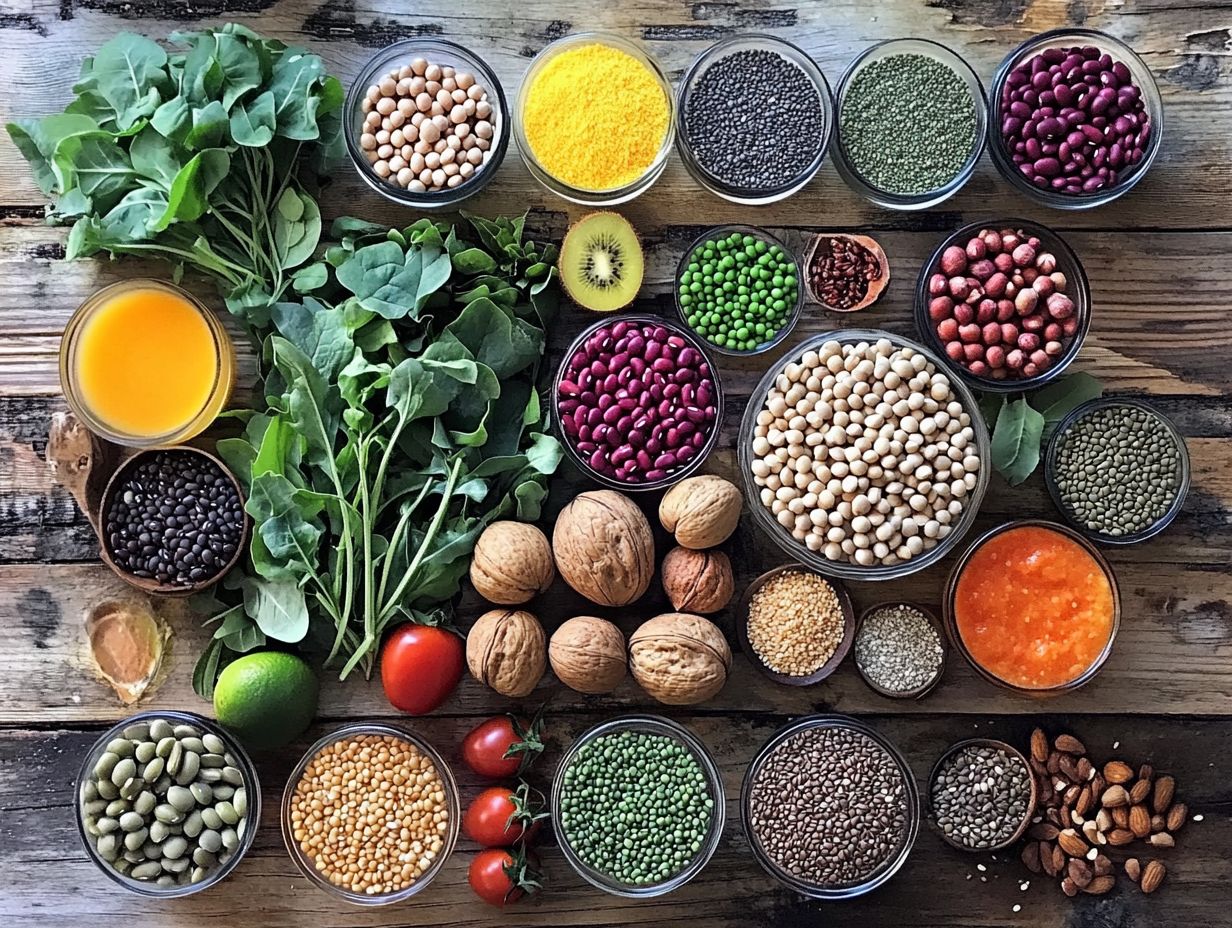
What are the top 5 whole foods to incorporate daily?
The top 5 whole foods to incorporate daily are fruits, vegetables, whole grains, lean proteins, and healthy fats.
Why should I add these foods to my daily diet?
These foods are packed with essential nutrients that your body craves! They provide vitamins, minerals, and antioxidants vital for your well-being.
How can I include more fruits in my daily diet?
Enjoy fruits as snacks or add them to your breakfast and smoothies. You can also mix them into salads or main dishes for extra flavor!
What are some examples of healthy fats?
Healthy fats include avocados, nuts, seeds, olive oil, and fatty fish like salmon. These are great options to support your health!
Which vegetables should I eat daily?
Leafy greens like spinach and kale are fantastic choices. Broccoli, cauliflower, and starchy veggies like sweet potatoes are also excellent additions!
Can I replace processed foods with whole foods?
Yes! Start swapping out processed foods for whole foods today to supercharge your health and boost your energy!


